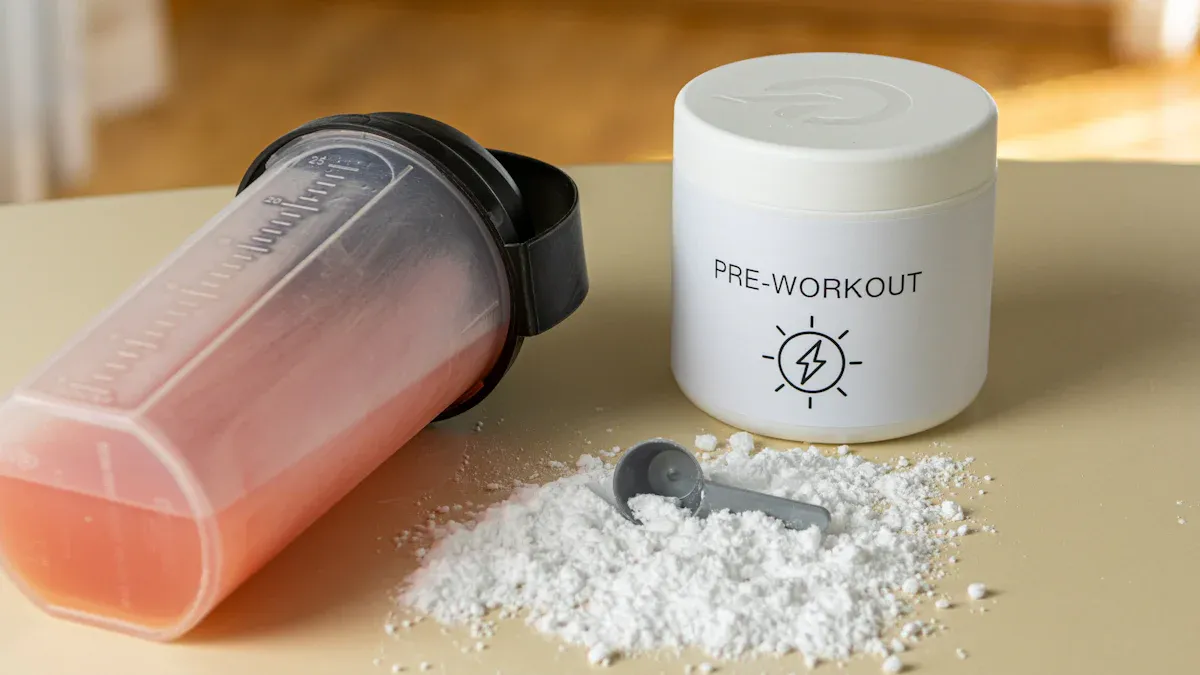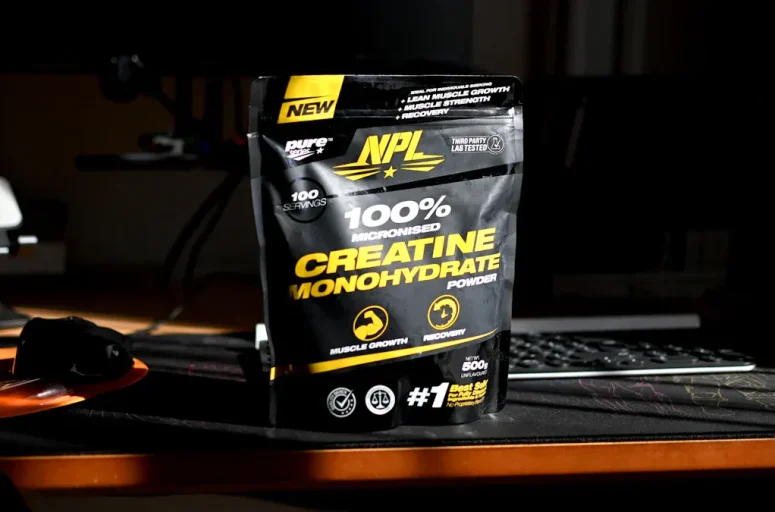
When you’re looking to push yourself harder during exercise, incorporating a pre-workout supplement can make a big difference. These supplements often include ingredients like caffeine, which boosts energy and focus, or beta-alanine, which helps you power through intense workouts. Research indicates that using beta-alanine consistently for 2–4 weeks can enhance performance in activities lasting 1–4 minutes. Similarly, caffeine provides a quick energy surge and supports endurance during longer workouts.
Pre-workout supplements are becoming increasingly popular. Approximately 30% of new gym-goers begin using them within their first month, highlighting how these products are closely tied to fitness goals such as building strength, increasing energy, and maintaining focus during workouts.
Key Takeaways
Pre-workout supplements can help you exercise better by boosting energy.
Caffeine is common and makes you feel awake during workouts.
Creatine gives extra energy for short, hard exercises like lifting.
Beta-alanine lowers muscle tiredness, helping in tough 1–4 minute activities.
Always check the ingredients to match your goals and limits.
Begin with a small amount to see how it affects you.
Try caffeine-free supplements if you’re sensitive or exercise at night.
Talk to a doctor before using supplements, especially with health issues.
What Are Pre-Workout Supplements?

Definition and Purpose
Pre-workout supplements are products made to improve your exercise performance. They usually have ingredients like caffeine, creatine, and beta-alanine. These work together to give you more energy, better focus, and greater endurance. They help you push yourself harder, whether you’re lifting weights, running, or doing HIIT workouts.
Pre-workout supplements can be grouped into two main types based on how they are used:
Type | What It Means |
|---|---|
Acute | Taken for a short time |
Chronic |
Many people use these supplements to improve their fitness results. But the benefits depend on the ingredients, how much you take, and how your body reacts. Some studies show they can help performance, but more research is needed to fully understand their safety and effectiveness.
Common Ingredients
Caffeine for Energy and Focus
Caffeine is one of the most popular ingredients in pre-workout supplements. It is a stimulant that boosts energy and improves focus. Taking caffeine before a workout can make you feel more awake and ready, especially for early or late workouts. Research shows caffeine helps you work harder for longer and makes exercise feel easier.
Creatine for Strength
Creatine is another important ingredient in pre-workout supplements. It helps your muscles produce energy for short, intense activities. This makes it great for strength training and power exercises. Studies show that using creatine regularly can increase muscle strength and size.
Beta-Alanine for Endurance
Beta-alanine helps reduce muscle fatigue by stopping acid buildup in your muscles. This lets you keep going during high-intensity workouts. It works best for activities lasting 1–4 minutes, like sprints or circuits. To get the full benefits, you need to use it for several weeks.
Other Ingredients: BCAAs and Nitric Oxide Boosters
Some pre-workouts include BCAAs to help muscles recover and reduce soreness. Nitric oxide boosters, like L-arginine and L-citrulline, improve blood flow to muscles. This helps deliver oxygen and nutrients, making you feel stronger and more energized.
Tip: Always read the ingredient list to make sure it fits your goals and tolerance.
Do Pre-Workout Supplements Improve Performance?
Scientific Evidence Supporting Effectiveness
Studies on Caffeine and Energy Levels
Caffeine is a key part of many pre-workout supplements. It helps boost energy and keeps you focused during exercise. Research shows caffeine makes workouts feel easier and improves alertness. For example, studies found caffeine helps with faster reaction times and more power in tough activities. This makes it a favorite for athletes who want better performance.
One study compared caffeine supplements to a fake pill (placebo). People who took caffeine biked farther and had more energy. This shows caffeine can help with endurance and longer workouts.
Research on Creatine and Strength Gains
Creatine is another important ingredient for building strength and muscle. It gives your muscles extra energy for short, hard exercises. Studies show creatine helps you lift heavier weights and do more reps. For example, people using creatine-based supplements gained more strength than those taking a placebo.
Beta-Alanine and its Impact on Endurance
Beta-alanine helps stop your muscles from getting tired too fast. It works by reducing acid buildup in muscles during hard workouts. Research shows beta-alanine is great for short, intense activities like sprints. A study found that combining beta-alanine with caffeine improved performance in high-energy exercises.
Limitations and Variability
Individual Differences in Response
Not everyone gets the same results from pre-workout supplements. Your genes, fitness level, and tolerance can affect how they work. Some people feel jittery from caffeine, while others don’t notice much. Creatine works best for people with low natural levels in their muscles. Knowing how your body reacts is important.
Placebo Effect and Psychological Factors
Believing a supplement will help can sometimes improve performance. Studies show this “placebo effect” can boost strength and focus. Even if the ingredients don’t work as expected, your mindset can still make a difference. This shows how mental attitude matters in fitness.
Performance Metrics Affected
Strength and Power
Pre-workout supplements are great for improving strength and power. Ingredients like creatine and caffeine help you lift heavier and do more reps. For example, one study showed people using pre-workouts lifted more weight than those taking a placebo.
Endurance and Stamina
Endurance athletes benefit from ingredients like beta-alanine and nitric oxide boosters. These help muscles get more oxygen and delay tiredness. Research shows pre-workouts improve performance in activities like running and cycling.
Mental Focus and Motivation
Pre-workouts also help with focus and staying motivated. Caffeine sharpens your mind and keeps you going during tough workouts. Studies show people using pre-workouts feel more focused and less tired, helping them push harder.
Note: Pre-workout supplements can help, but results vary by person. Start with a small dose to see how your body reacts. Talk to a doctor if you have concerns.
Potential Risks and Side Effects of Pre-Workout Supplementation
Pre-workout supplements can help you exercise better, but they may also cause problems. Knowing these risks can help you make smarter choices for your workouts.
Common Side Effects
Too Much Caffeine Can Cause Jitters
Caffeine gives energy, but too much can make you feel shaky. You might get a fast heartbeat, feel nervous, or even anxious. These problems happen more if you take too much or don’t handle caffeine well. A 2019 study showed 54% of people had side effects like heart issues after using pre-workouts. To stay safe, keep track of how much caffeine you take.
Stomach Problems from Certain Ingredients
Some ingredients in pre-workouts can upset your stomach. Things like sodium bicarbonate, magnesium, or caffeine might cause nausea, bloating, or diarrhea. This often happens if you take them on an empty stomach or use too much. If this happens, lower your dose or try a different product.
Dependency and Tolerance Over Time
Using pre-workouts often can make your body depend on them. Over time, stimulants like caffeine may stop working as well. You might need more to feel the same effects, which raises the chance of side effects. Taking breaks can help your body reset and avoid dependency.
Note: Everyone reacts differently to pre-workouts. Start with a small amount to see how your body handles it.
Safety Tips for Pre-Workout Supplementation
Begin with a Small Dose
Start with the lowest dose when trying a new pre-workout. This helps you see how your body reacts and lowers the chance of side effects. Only increase the dose if you handle it well and need more benefits.
Avoid Taking It Late in the Day
Pre-workouts often have stimulants like caffeine that can mess up your sleep. Poor sleep can hurt your recovery and performance. To avoid this, take pre-workouts at least 4–6 hours before bedtime. If you exercise at night, try a stimulant-free option.
Look for Clear Labels and Testing
Pick supplements with clear ingredient lists. Avoid ones with “proprietary blends” that hide ingredient amounts. Look for third-party testing to ensure safety and quality. Clear labels help you choose products that match your goals and tolerance.
Study | Findings |
|---|---|
2019 Study | |
2018 Study | Pre-workouts raised blood pressure but didn’t change heart rate much. |
Tip: Learn about the ingredients in your pre-workout to understand their effects and risks.
How to Pick the Best Pre-Workout Supplement
Picking the right pre-workout supplement can boost your workouts. It helps you meet fitness goals and improve performance. By matching supplements to your needs, checking ingredients, and knowing your limits, you can make better choices.
Matching Supplements to Your Goals
Energy and Focus for Cardio or HIIT
For cardio or HIIT, choose supplements with caffeine and nitric oxide boosters. These give energy and improve blood flow, keeping you focused during fast workouts. A study showed taking a high-energy supplement before exercise delayed tiredness and increased workout time. This makes it great for endurance activities.
Strength and Power for Weightlifting
For weightlifting, look for creatine and beta-alanine. Creatine gives muscles energy for short, heavy lifts. Beta-alanine reduces muscle tiredness during repeated sets. Research shows creatine helps lift heavier weights and do more reps. Beta-alanine helps by stopping acid buildup, so you can push harder.
Tip: Match supplements to your goals. For muscle growth, try protein powders or BCAAs. For endurance, beta-alanine and electrolytes are helpful. For weight loss, green tea extract and CLA can help burn fat.
Checking Ingredient Labels
Why Reading Labels Matters
Always check the labels on pre-workout supplements. Clear labels show exactly what’s inside. Studies say 44% of pre-workouts use hidden blends, making it hard to know ingredient amounts. This can cause side effects. Choose products with clear labels to avoid surprises.
Avoid Hidden Blends
Hidden blends mix ingredients without showing amounts. This makes it hard to know if they’re safe or effective. Research says multi-ingredient pre-workouts are more likely to cause problems like nausea or heart issues. Picking supplements with clear amounts helps you stay safe and in control.
Note: Look for third-party tested products. These are safer and more reliable. Certifications can guide you to better choices.
Knowing Your Limits
Testing Caffeine Sensitivity
People react differently to caffeine. Start with a small amount to see how you feel. If you get jittery or too energized, lower the dose or try a caffeine-free option. Watching your reaction helps avoid problems and get the most benefits.
Choosing Stimulant-Free Options
If you don’t want stimulants, pick stimulant-free supplements. These often have beta-alanine, creatine, and BCAAs. They improve performance without boosting energy levels. Stimulant-free options are great for evening workouts or for people sensitive to caffeine.
Tip: Adjust supplements based on how your body reacts. Regular checks help keep them effective and prevent overuse.
Choosing the right pre-workout supplement means thinking about your goals, checking ingredients, and knowing your limits. Smart choices can make your workouts better and safer. Ready to try one? Check out this recommended pre-workout supplement for a trusted option.
Pre-workout supplements may help you exercise better. Their success depends on the ingredients, how much you take, and your body’s reaction. Ingredients like caffeine, creatine, and beta-alanine can work well, but results differ for everyone. Always pick safe products with clear labels that match your fitness goals. Talk to a doctor before using them. Some supplements might have hidden or harmful ingredients. A doctor can guide you to make smart choices for your workouts and health.
FAQ
When should you take a pre-workout supplement?
Take it 20–30 minutes before exercise. This lets your body absorb the ingredients and helps you perform better.
Can you use pre-workout supplements daily?
You can, but it’s best for workout days only. Using them daily might make your body get used to them. Take breaks to keep them effective and avoid relying on them.
Are pre-workout supplements okay for beginners?
Yes, but start with a small amount to see how you feel. Pick products with clear labels and avoid ones with too much caffeine. Ask a doctor if you’re unsure.
Do pre-workout supplements help with weight loss?
Some can boost energy and burn calories, helping with weight loss. Look for caffeine or green tea extract. They work best with healthy eating and regular exercise.
What should you avoid in pre-workout supplements?
Stay away from hidden blends or too many stimulants. Check for safety testing. Ingredients like yohimbine or DMAA can be risky.
Do stimulant-free pre-workouts work well?
Yes, they help without caffeine. They often have creatine, beta-alanine, or BCAAs to improve strength, endurance, and recovery.
Can you mix pre-workout supplements with other products?
You can, but be careful. Don’t mix too much caffeine to avoid feeling jittery. Always check labels to stay within safe limits.
How long do pre-workout effects last?
They usually last 2–4 hours, depending on the ingredients and your body. Caffeine-based ones may last longer, so don’t take them near bedtime.
Tip: Read the label and follow the instructions for safe use.


